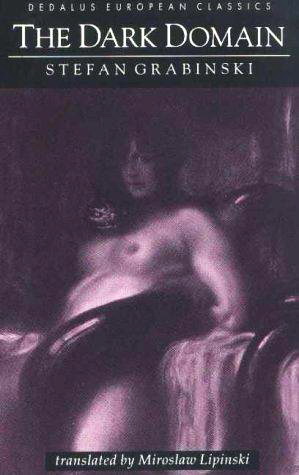 By STEFAN GRABINSKI (Dedalus; 1918/22/93)
By STEFAN GRABINSKI (Dedalus; 1918/22/93)
Here’s an excellent single author anthology from the UK’s Dedalus Books, who can always be counted on to unearth vital and interesting European authors. Largely unknown in the English-speaking world, Poland’s Stefan Grabinksi (1887-1936) wrote several “psycho-fantasies” during the years 1918-22. These stories have a style and outlook that dimly recall the short work of Thomas Ligotti and Ramsey Campbell—and the cinema of fellow countryman Roman Polanski—but are largely unique to themselves.
Based on the present collection, sex was a particular preoccupation of Grabinski. It’s a subject that’s given ahead-of-its-time prescience in three tales herein: “Fumes”, “Szamota’s Mistress” and “In the Compartment.” The first is a hallucinatory evocation of a young engineer’s seduction by a voluptuous woman who may or may not be a hermaphrodite, in a tale notable for boldly exploring the depths of madness in a narrator who’s clearly a repressed homosexual. “Szamota’s Mistress,” meanwhile, pivots on necrophilia, and the train-set “In the Compartment” upon a deadly love triangle.
The setting of the latter story brings up another of the author’s favored motifs: trains. His 1919 collection THE MOTION DEMON was apparently Grabinski’s most popular book during his lifetime, illustrating (as the present introduction by Miroslaw Lipinski makes clear) his adherence to the elan vital concept of philosopher Henri Bergson, which postulated that a type of spiritual energy underlies and influences reality. In train travel Grabinski found an ideal metaphor for same, as expressed by the ghostly locomotive of “The Wandering Train” and “The Motion Demon,” about a compulsive nomad confronting that very personage aboard a Parisian train ride.
Madness was another constant in Grabinski’s tales. The head-snapping “Saturnin Sektor,” in which a madman is harassed by an errant watchmaker, is about as powerful a study of a dual personality as any I’ve read. Equally notable is “The Glance”, whose protagonist is terrified of looking backward and turning corners, and “The Area,” featuring a writer harassed by products of his own disturbed imagination.
I’ve heard many complaints about the translations contained in THE DARK DOMAIN, to which I’ll have to add my voice. Grabinksi has a strong and distinctive style, yet the prose is quite crude in spots, with a puzzling tendency to taper off into ellipses. That’s doubtless a pivotal element of Grabinski’s writing, but as rendered in English by Miroslaw Lipinski it’s not always satisfyingly pulled off.
Another complaint I have is that, simply, the book is too short (153 pages, which include a forward and afterward). As a representation of Stefan Grabinski’s life’s work it’s tantalizing, certainly, but doubtlessly incomplete. The good news is that since the early nineties release of this book three more Grabinski collections have appeared in English, and after reading THE DARK DOMAIN it’s quite likely you’ll feel the same way I did, which is to say you’ll definitely be wanting more.
